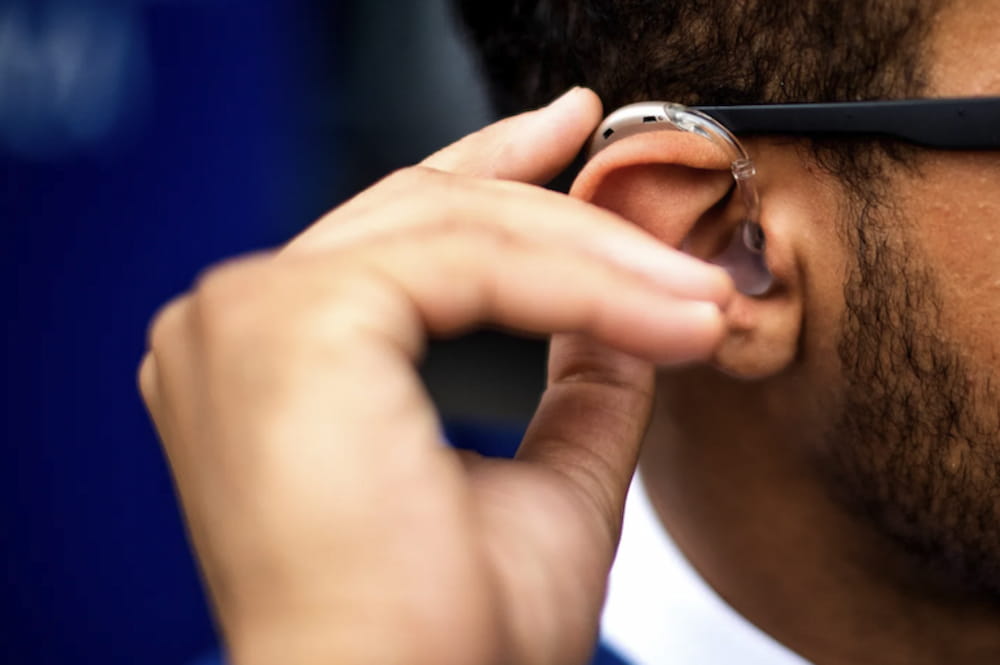
Speech and Language Programs
The Boston Guild for the Hard of Hearing was founded in 1916 and was originally called the Speechreader’s Guild. The vision of the Guild at that time was to establish a haven where the problems associated with hearing loss would be understood and addressed.
Northeastern University was chosen to continue the Guild’s mission of providing the highest quality of services to hard-of-hearing individuals and to the community. The Boston Guild for the Hard of Hearing at Northeastern is committed to serving the needs of people with hearing loss and finding innovative ways to disseminate information to professionals and others in order to increase awareness about the total impact of hearing loss and the importance of hearing conservation.


Boston Guild Hearing Aid Outreach Program offers quality hearing care and hearing aid(s) to individuals in the community who need financial assistance. This outstanding program offers a complimentary hearing evaluation, consultation regarding amplification options, and training sessions that teach vital skills to improve communication for individuals with hearing loss and their families. Individuals qualify for this program by completing the application and having a member of the community (e.g., audiologist, health care provider, social worker, clergy) complete the referral section of the application stating that they require financial assistance. Please download the application and mail it to the address on the application. All parts of the application must be completed for it to be processed.
The application is also available in Spanish.
Eligibility: To qualify for hearing aids, individuals must:
Eligibility for financial assistance for Assistive Listening Devices only requires proof of financial need.
The Assistive Listening Device Program provides an inventory of various devices for display and demonstration. Financial assistance is available through the Hearing Instrument Outreach Program.
Assistive Listening Devices (ALDs) can be used by people with all degrees/types of hearing loss and even by those with normal hearing. They are helpful in the home, workplace, classroom, places of worship, and in concert halls or other places of entertainment such as movie theaters. The goal of this program is to provide individuals with an opportunity to learn about and try various devices during their appointment in the Speech-Language and Hearing Center at Northeastern.
Assistive Listening Devices (ALDs) are basically amplifiers that bring the speaker’s voice directly into the ear while reducing the loudness level of unwanted wounds such as background noise. They can be very helpful if a person is experiencing difficulty hearing in background noise, when listening from a distance, during group discussions, and while listening on the telephone or to the television. Examples of ALDs include telephone amplifiers, infrared headphones, and personal FM trainers.
Other types of devices, including alerting devices, help a person access communication and their environment by using senses like vision or touch instead of hearing. Examples include closed captioning devices, text telephones, vibrating pagers, and alarm clocks that flash/vibrate.
Aural Rehabilitation and Speech Reading Classes provide our hard-of-hearing patients and their significant others with skills and technology updates to help reduce the impact of hearing loss on communication.
A hearing aid alone is not always enough to overcome the challenges of hearing loss. Other tools that can be used to address communication issues include; an understanding of one’s hearing loss and listening implications, the knowledge and skills to use communicative strategies to enhance communication, and information about new technology that might assist in various listening situations. The goal of this program is to provide hard-of-hearing persons with tools and resources to make communicating in daily life easier.
Participation in aural rehabilitation and speechreading programs has been shown to increase motivation and compliance in using amplification, and the group process helps people to develop realistic expectations. Family members or significant others are encouraged to attend the session so that they can gain a better understanding of their loved one’s hearing loss and ways to help prevent communication breakdowns and reduce frustration.
Classes are held in the Speech-Language and Hearing Center at Northeastern University. Audiology and speech-language pathology students lead the group classes under the supervision of a licensed and certified audiologist.
The Community Outreach Program provides information and services to hard-of-hearing individuals, family members, and professionals, as well as to the general public.
Hearing loss continues to decrease the quality of life for many individuals as it affects the social, emotional, educational, and vocational aspects of their lives.
The goal of this program is to promote hearing health through prevention, early detection, treatment, and rehabilitation, as well as increase awareness and understanding of the total impact of hearing loss. Services are provided both at Northeastern and in the community to health centers and clinics, schools, preschool programs, retirement communities, senior-citizen centers, health fairs, and places of employment.